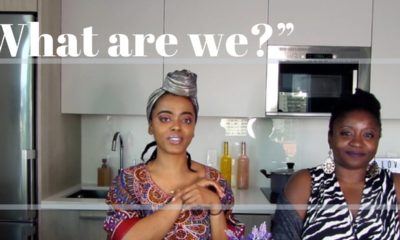Features
Atoke: NCA For the Middle-Aged Girls Who Wanna Go Back to School

I have not written in ages, so this is actually harder than I thought it would be. I decided to write this piece a week ago, but I’ve been crippled with a fear of not being able to write. Fear of wondering whether I still know how to write an opening paragraph. I’ve spent the last hour browsing through Ogbongeh.com trying to figure out what Nigerian groceries I can order while I’m in London. I’ve read some of my old work to see if I sound like me in my head today. I’ve eaten half a bag of chinchin from NaijaTreats, consoling myself that eating snacks beats writing about the NCAs. I’ve backspaced the first paragraph of this piece at least twenty-five times, so if you see this version, it means I decided to stop procrastinating and doubting my ability and just get the f*ck on with it.
So, I’ve just finished writing a bunch of exams as part of the requirements to become a licensed lawyer in Canada. The ‘why’ for this decision, which I made as a 40-year-old who had completely pivoted out of law into a whole different career space, is a story for another day. However, 10 years after I officially ditched law to become a writer, I found myself aggressively reading the decisions of the Supreme Court of Canada. What I hope to do with this piece is to share some tips and tricks for middle-aged girls who are thinking about doing the National Committee on Accreditation (NCA) exams as part of their licensing process in Canada. I also hope to share stuff I’ve learned on this journey in hope that someone out there might find it helpful.
I’m going to start by saying that I’ve thoroughly enjoyed the process; which might sound weird because the last year of my life has basically been me studying, working and essentially having no life. Rinse. Repeat. However, because I had gone into this being very clear about what I wanted and determined to have fun, or get out, I think this really helped. I also told myself that this was not a do-or-die affair. If I tried and it made me miserable, then I was gonna leave it. And I acknowledge that I have a full-time job; which, in a way, is a blessing and a curse, but it also removed the edge of desperation from my approach to the exams. So here goes:
Know your ‘why’ for doing the exams
It’s important to be comfortable with your why and go in with an attitude that matches your ‘why’ because the road ahead is going to be bumpy – this is life. Sh*t happens. You could study intensively for 3 months and have COVID 2 days before your exams and you have to cancel. Or you could even write the exams and fail – money is gone, your time seems wasted and everything seems futile. I’d like to reassure you that it’s not the end of the world. You lick your wounds, you get sad, you get back into the saddle as and when it works for you, and you ride!
Knowing your why for getting accredited as a foreign-trained lawyer who wants to practice is crucial. It’ll really set the pace for how you tackle every step that you take on the journey. If you’re doing it because everyone who was in your class who relocated is doing it, that’s your why, but know that that ‘why’ is contingent on ‘everyone’ who is not you, and so, when bumps show up down the road, the only person who’s gonna be on that ride with you is you.
. I think this tip works for any kind of academic pursuit you are embarking on when you’re a little older.
For the older girls, I recognize that this may be a bit more challenging because you probably have so many other irons in the fire and it may not be quite easy to distil/ articulate your motivation, but it’s really crucial to do this before your start.
Do your research
This is so crucial to everything. I find that with a lot of things I do, I’m extremely curious. I want to read the instructions carefully. I want to know what the source of a throwaway screenshot came from. I want to know what the official statement on a situation is. Sometimes, hearsay is fine, and reading threads on discussion boards are great, but going to the source of the information? Nothing beats that! You don’t want to go into a whole accreditation/licensing journey with half-baked information or a partial knowledge base, and then say ‘well, I didn’t know.’ The information you need is on the NCA website and the website of the licensing body of whichever province you want to go to. Please take the time to familiarize yourself with current information. Don’t simply rely on what Diran told you from when he wrote his exams in 2020. Two years is a long time and things change. Please, older girlies, do your research.
Find your tribe
A few years ago, a group of Nigerians in Canada who were on this lawyer licensing journey decided to come together to share their ideas and study together. First, they started on Facebook, and then they went on WhatsApp. They created an ideas-hub, study-buddy system which has blossomed. They’ve had ups and downs, people who’ve come and go, but this group has remained.
When I first workshopped the idea of getting my license in Canada, a few people suggested I joined this group, to which I snorted for a few reasons: I thought, I’ve never been a study group kind of girl. I never attended a single study group in all my life, I wasn’t going to start at 40. The second reason why I snorted was that I thought… ah, a group of Nigerians – the feminist radical in me is gonna be pissed all the time. I didn’t want to be exposed to homophobia or sexism or people sharing religious passages and things that Nigerian communities are generally known for. But, my cousin was on that group and she essentially told me to calm my tits and just join. I did. Over the course of my exams, I learned so much from the group members. I was able to find smaller groups and created an even smaller network of women who are nothing short of brilliant. There is no doubt that Nigerian women are the bulwark of families; I met women across a wide age range who were working, parenting and studying to boot! These women would be in class, tutoring or asking questions and their kids would be afoot. I watched women juggle these tasks so gracefully. It’s hard to be in those groups and not really see women for what we really are: superstars.
So, this tip is particularly for the older girlies – you are not alone. Find your tribe. Study with the people whose schedule works for you. Share ideas. How you studied when you were younger may not necessarily work for now. Please don’t beat yourself up about it, just know that you are not alone. Don’t be shy, ask questions, ask for clarification and share your experiences.
Study strategically
For every exam in the NCA process, there is a course syllabus. The Federation of Law Societies of Canada has set out learning outcomes and their expectations of candidates are laid out in the syllabi. Read those really carefully and tailor your studying to meet what the syllabus has outlined. Study. Don’t cut corners. If something doesn’t feel right or sound right, ask your study buddies what they think. Go back and study some more. Study like you wanna learn. I say this because I find that knowing what you’re studying helps you to understand the questions in the exams. The learning outcomes are supposed to help you build a knowledge base for working as a lawyer in Canada. A lot of times, with foreign-trained lawyers, we bring a lot of our home experience here, which is not a bad thing. However, knowing that the jurisdiction is different, the culture is different and the profession itself is different should be key in how you approach your studying. It is not enough to read the notes ‘and pass’. If you’re planning to actually work as a lawyer (particularly sole practitioners) the building blocks of the NCA should not be neglected.
You might think it’s an inconvenience to have to go over and above to study but think about it as a way of starting your legal career with a sound base. For the old girlies, I recognize that there might be a scarcity of time; studying is not the only thing you’ve got going on, this is when I would like to remind you to remember your why. You don’t have to rush the exams. You don’t have to finish writing in 5 months. Or 3, or whatever time they say in the FTLC exit testimonials. Pace yourself. You don’t have to rush. If it takes you a year, then do it. If it’ll take you two years, then it’s two years. Take one exam at a time if that’s what your schedule permits, but please, study. Study with the intent to learn, be curious, read cases (*don’t throw axes at me*). But seriously, read cases.
There’s this idea that reading cases are boring and tedious. I would argue that some of the funniest and most intellectual stuff I’ve read have been judicial reasoning from the SCC bench. If your preference is for summaries, please read the summaries from the courts. I say this because some of the paraphrased summaries contain erroneous facts and if you, unfortunately, read the summary from someone who didn’t grasp the actual issues within the case, you’re down the wrong path.
So girlies, study strategically and with the intent to know.
Don’t panic
This might seem easier said than done, but if you follow the tips I’ve outlined sequentially, it’s doable. However, panic and anxiety – the twin monsters of self-doubt – are probably going to show up every time you have an exam looming or every time you think you’ve got this. Don’t worry, indeed, you have got this.
Work out the source of the anxiety. For me, it was the thought that the last time I did anything law related was in 2012. 10 years later, I was trying to re-read Administrative Law. I had studied and I work at an ADM, so why the hell was I so scared and nervous? I spent 3 months studying for the Admin law exams, worried sick that I had overestimated the capabilities of my 40s brain. But there was no way I was not going to do it. So, I did it. I wrote the exam and it felt like a boil had been excised. So, if you’re scared, remember the work you’ve put in; remember your why; remember you’ve got a tribe; remember how much knowledge you’ve garnered… and jump! Don’t be scared, even if you fall – people in your trust bubble will be there to rub a balm on your hurting bum.
So girlie, you’ve got this! Go ahead and register for those exams.
***





















